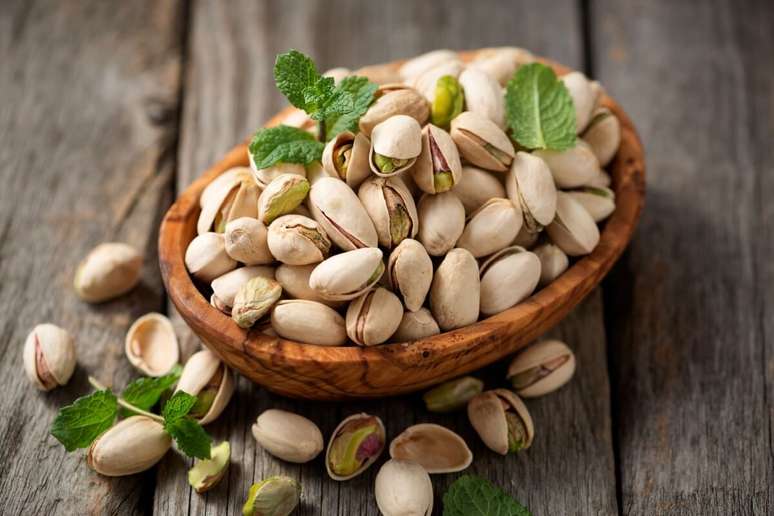Find out how these oilseeds benefit the body and help prevent diseases
Pistachios, a small and tasty dried fruit, are much more than a simple snack. Native to the Middle East and cultivated in various parts of the world, it is known for its extraordinary nutritional profile, rich in proteins, fibre, essential vitamins and minerals. Therefore, in addition to its pleasant taste, it offers a number of health benefits.
Discover, below, 7 health benefits of pistachios and discover how this small nut can be a powerful ally in your daily life.
1. Rich in essential nutrients
Pistachios are an excellent source of numerous essential nutrients. In a serving of just 28 grams, it provides protein, fiber, vitamins (like B6 and E) and minerals (like potassium, magnesium and phosphorus). These vitamins and minerals play crucial roles in a variety of bodily functions, from energy production to maintaining bone health.
2. Promotes heart health
Regular consumption of pistachios is associated with improved cardiovascular health. According to nutritionist Natália Colombo, oilseeds, a group of which pistachios are part, should be part of a eat healthybecause they are made up of good fats. “They regulate cholesterol levels, reducing LDL (bad cholesterol) and increasing HDL (good cholesterol), preventing atherosclerosis and hypertension, contributing to a healthier heart and brain,” he explains.

5 tips for balancing protein consumption before and after training
3. Helps control weight
Although they are high in calories, pistachios can be beneficial for weight management. This is because the high amount of protein and fiber can increase satiety, reducing your overall calorie intake.
“Fibres give greater satiety and slow down gastric emptying. Therefore, the feeling of hunger takes a long time to appear and, consequently, can lead to less food intake,” says nutritionist Roberta Stella. Additionally, having to shell pistachios before eating them can help you eat more slowly and consume less.

4. Benefits for eye health
Pistachios contain high levels of antioxidants such as lutein and zeaxanthin, which are essential for eye health. These antioxidants help protect your eyes of the damage caused by blue light and reduce the risk of age-related eye diseases such as macular degeneration and cataracts.
5. Improves digestive health
The dietary fiber present in pistachios is beneficial for digestive health. A serving of pistachios provides about 3 grams of fiber, which can help promote bowel regularity, prevent constipation and improve the overall health of the digestive system. “[As fibras] they promote intestinal transit, as they play an important role in the formation of fecal matter and in the maintenance of intestinal flora”, adds nutritionist Ronimara Santos.
6. Helps regulate blood sugar
Pistachios can help control blood sugar levels, making them a great option for people with diabetes or insulin resistance. The combination of fiber, protein and healthy fats helps slow the absorption of glucose into the bloodstream, preventing sugar spikes.
“A healthy diet, with a dietary model that favors natural and varied foods, is the basis for the prevention and treatment of obesity and diabetes”, says Dr. Deborah Beranger, endocrinologist, graduated in Endocrinology and Metabology at the Santa Casa de Misericórdia of Rio De Janeiro (SCMRJ).
7. Strengthens the immune system
Pistachios are a good source of vitamin B6, which is essential for the body’s function immune system. It plays a crucial role in the production of white blood cells, the body’s defense cells. Furthermore, the antioxidants present in pistachios help fight oxidative stress, further strengthening the immune system.
“An organism with low immune defenses presents greater susceptibility to infections, difficulty recovering from diseases, increased risk of autoimmune diseases, worsening of chronic diseases and decreased quality of life,” says Dr. Jackeline Barbosa, vice president of medical- science of the Herbarium University.
Source: Terra
Ben Stock is a lifestyle journalist and author at Gossipify. He writes about topics such as health, wellness, travel, food and home decor. He provides practical advice and inspiration to improve well-being, keeps readers up to date with latest lifestyle news and trends, known for his engaging writing style, in-depth analysis and unique perspectives.





![More beautiful life in advance: What awaits you on Tuesday 14, 2025 on Tuesday, October 14 in 441 episodes [SPOILERS] More beautiful life in advance: What awaits you on Tuesday 14, 2025 on Tuesday, October 14 in 441 episodes [SPOILERS]](https://fr.web.img5.acsta.net/img/6b/c3/6bc3aa68e4679ab288217fa4c5dc825e.jpg)


